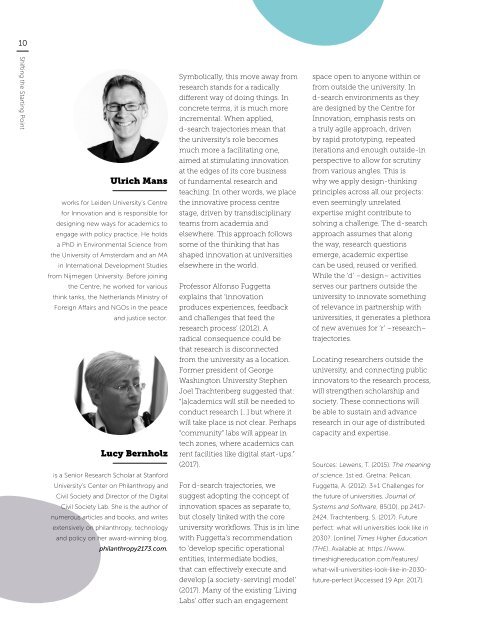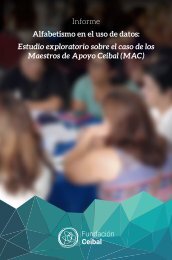trend-report-dps-web-version
Create successful ePaper yourself
Turn your PDF publications into a flip-book with our unique Google optimized e-Paper software.
10<br />
11<br />
Shifting the Starting Point<br />
Ulrich Mans<br />
works for Leiden University’s Centre<br />
for Innovation and is responsible for<br />
designing new ways for academics to<br />
engage with policy practice. He holds<br />
a PhD in Environmental Science from<br />
the University of Amsterdam and an MA<br />
in International Development Studies<br />
from Nijmegen University. Before joining<br />
the Centre, he worked for various<br />
think tanks, the Netherlands Ministry of<br />
Foreign Affairs and NGOs in the peace<br />
and justice sector.<br />
Lucy Bernholz<br />
is a Senior Research Scholar at Stanford<br />
University’s Center on Philanthropy and<br />
Civil Society and Director of the Digital<br />
Civil Society Lab. She is the author of<br />
numerous articles and books, and writes<br />
extensively on philanthropy, technology<br />
and policy on her award-winning blog,<br />
philanthropy2173.com.<br />
Symbolically, this move away from<br />
research stands for a radically<br />
different way of doing things. In<br />
concrete terms, it is much more<br />
incremental. When applied,<br />
d-search trajectories mean that<br />
the university’s role becomes<br />
much more a facilitating one,<br />
aimed at stimulating innovation<br />
at the edges of its core business<br />
of fundamental research and<br />
teaching. In other words, we place<br />
the innovative process centre<br />
stage, driven by transdisciplinary<br />
teams from academia and<br />
elsewhere. This approach follows<br />
some of the thinking that has<br />
shaped innovation at universities<br />
elsewhere in the world.<br />
Professor Alfonso Fuggetta<br />
explains that ‘innovation<br />
produces experiences, feedback<br />
and challenges that feed the<br />
research process’ (2012). A<br />
radical consequence could be<br />
that research is disconnected<br />
from the university as a location.<br />
Former president of George<br />
Washington University Stephen<br />
Joel Trachtenberg suggested that:<br />
“[a]cademics will still be needed to<br />
conduct research […] but where it<br />
will take place is not clear. Perhaps<br />
“community” labs will appear in<br />
tech zones, where academics can<br />
rent facilities like digital start-ups.”<br />
(2017).<br />
For d-search trajectories, we<br />
suggest adopting the concept of<br />
innovation spaces as separate to,<br />
but closely linked with the core<br />
university workflows. This is in line<br />
with Fuggetta’s recommendation<br />
to ‘develop specific operational<br />
entities, intermediate bodies,<br />
that can effectively execute and<br />
develop [a society-serving] model’<br />
(2017). Many of the existing ‘Living<br />
Labs’ offer such an engagement<br />
space open to anyone within or<br />
from outside the university. In<br />
d-search environments as they<br />
are designed by the Centre for<br />
Innovation, emphasis rests on<br />
a truly agile approach, driven<br />
by rapid prototyping, repeated<br />
iterations and enough outside-in<br />
perspective to allow for scrutiny<br />
from various angles. This is<br />
why we apply design-thinking<br />
principles across all our projects:<br />
even seemingly unrelated<br />
expertise might contribute to<br />
solving a challenge. The d-search<br />
approach assumes that along<br />
the way, research questions<br />
emerge, academic expertise<br />
can be used, reused or verified.<br />
While the ‘d’ –design– activities<br />
serves our partners outside the<br />
university to innovate something<br />
of relevance in partnership with<br />
universities, it generates a plethora<br />
of new avenues for ’r’ –research–<br />
trajectories.<br />
Locating researchers outside the<br />
university, and connecting public<br />
innovators to the research process,<br />
will strengthen scholarship and<br />
society. These connections will<br />
be able to sustain and advance<br />
research in our age of distributed<br />
capacity and expertise.<br />
Sources: Lewens, T. (2015). The meaning<br />
of science. 1st ed. Gretna: Pelican.<br />
Fuggetta, A. (2012). 3+1 Challenges for<br />
the future of universities. Journal of<br />
Systems and Software, 85(10), pp.2417-<br />
2424. Trachtenberg, S. (2017). Future<br />
perfect: what will universities look like in<br />
2030?. [online] Times Higher Education<br />
(THE). Available at: https://www.<br />
timeshighereducation.com/features/<br />
what-will-universities-look-like-in-2030-<br />
future-perfect [Accessed 19 Apr. 2017].<br />
LEARNING EXPERIENCE<br />
DESIGN: A NEW WAY OF<br />
LEARNING<br />
1. FROM KNOWLEDGE TO BEHAVIOUR<br />
Successfully transferring knowledge is only one aspect<br />
of learning: gaining insights, building new skills and<br />
creating proactive behaviour are desired learning<br />
outcomes of equal measure. The LXD methodology<br />
rewards active behaviour by evaluating process<br />
instead of output. By encouraging students to analyse,<br />
experiment and implement projects, as well as asking<br />
them to reflect on their experience, they can build<br />
confidence to fail and learn to adapt to changing<br />
circumstances.<br />
2. FROM CONSUMERS TO PRODUCERS<br />
By allowing students to choose their own subject<br />
matter, we give them autonomy of their own learning<br />
process with an aim to motivate and empower.<br />
The purpose of this self-directed approach is to<br />
turn students from consumers of information into<br />
producers of knowledge. This challenge-based<br />
learning aims to encourage an appetite for insight and<br />
lifelong learning.<br />
What makes an experience both educational and inspiring?<br />
And how do you design such an experience? That’s what Learning<br />
Experience Design (LXD) is all about.<br />
LXD is a movement of designers, teachers, educational experts,<br />
scientists and publishers who are looking for better ways to learn.<br />
They propose an integral design methodology and learner-centred<br />
approach to education, and have identified four developments in<br />
learning methods that could help shape the education of the future:<br />
3. FROM SPECIALISATION TO CONTEXTUALISATION<br />
Promoting interdisciplinary exchange of theory,<br />
methods and applications serves to benefit students’<br />
insights and stimulates new interests. Mixing students<br />
into teams of different academic, cultural and skills<br />
backgrounds could offer unexpected crossovers and<br />
encourage interdisciplinary thinking. In this way,<br />
students could learn to see beyond the limits of their<br />
own field and learn how to work in teams.<br />
4. FROM SCIENCE TO SOCIETY<br />
LXD is about creating a space where learning<br />
outcomes can contribute to making societal impact.<br />
Why do we simulate abstract exercises when there are<br />
enough real challenges to be tackled? For example, as<br />
part of the development of a project, students could<br />
be asked develop a start-up with the main goal being<br />
helping local communities, using crowdfunding as a<br />
tool to raise awareness. In this way, students share their<br />
work and leverage the potential of their networks for<br />
quality feedback.<br />
Sjoerd Louwaars is the founder of Centre for Innovation's Changemakers Lab.<br />
He runs the Innovation, Co-creation and Global Impact Minor as well as the Venture<br />
Academy, a start-up programme for students.<br />
Learning Experience Design





